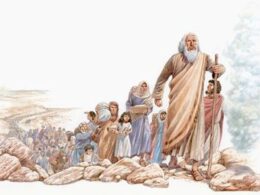Perhaps the most challenging aspect of Christlike leadership is Jesus’ teaching on servanthood.
“The Son of Man did not come to be served, but to serve, and to give his life as a ransom for many”
Lausanne Movement
Connecting influencers and ideas for global mission
2004
This is an excerpt from Lausanne Occasional Paper 41: Future Leadership which was published in connection with the 2004 Forum on World Evangelization.
The Lausanne Committee for World Evangelization, more commonly known as the Lausanne Movement, is a global movement that mobilizes evangelical leaders to collaborate for world evangelization.
The stated vision is “the whole church taking the whole gospel to the whole world”.
To be a Christlike leader means first to be Christlike in character.
The “fruit of the Spirit” (Galatians 5:22, 23) is what the Holy Spirit produces in the life of a believer.
In summary, Christlike qualities are love, joy, peace, patience, kindness, goodness, faithfulness, gentleness and self-control.
Abundant fruit production is possible only for the one who lives in intimate union with Jesus Christ, as a branch remains in the vine (John 15:1–8).
Intimacy with God, therefore, must be the primary focus of the leader’s life.
In summary, Christlike qualities are love, joy, peace, patience, kindness, goodness, faithfulness, gentleness and self-control.
Intimacy with God, therefore, must be the primary focus of the leader’s life.
Christlike character is the product of a life that is genuinely submitted to Jesus Christ and His word, just as Jesus the Son of God submitted to the Father.
Leadership begins with follower-ship.
The first step in the leadership development process for Jesus’ disciples was to obey His call to “follow me.”
Only the one who has learned to follow is qualified to lead.
Only the one who has learned to listen to God through meditation on the word of God and learning to recognize the promptings of the Spirit of God is prepared to speak for God.
Only the one who has learned to listen to God through meditation on the word of God and learning to recognize the promptings of the Spirit of God is prepared to speak for God.
When leaders are genuinely listening to God, and keeping in step with the Spirit of God, they will naturally find themselves in tune with one another as well.
Jesus prayed that His followers would be one as the Father and Son were one, and that their complete unity would show the world that God loved them and had sent Christ (John 17:20–23).
The proof to the world that the disciples were genuinely followers of Jesus would be their love for one another, the same love that Jesus had showed to them (John 13:34, 35).
The primary mark of the Christlike leader, then, will be his/her love for other disciples of Jesus, including other Christian leaders.
The proof to the world that the disciples were genuinely followers of Jesus would be their love for one another, the same love that Jesus had showed to them
Christlike leadership means integrity, that is having every dimension of life centred in consistent obedience to God.
There are no “closets”, no hidden areas that cannot bear public scrutiny.
The leader with integrity is above reproach in financial dealings, in sexual behaviour, and in family life.
No area of life is out of control.
Physical discipline, emotional discipline, and spiritual discipline express a life centred consistently on intimate friendship with God.
Christlike leadership includes not only engagement with the needs of others, but also withdrawal for times of solitude and prayer.
Not even Jesus was available to all people at all times.
Periodically he spent focused time with the inner circle of his companions.
Regularly he pursued time alone with His heavenly Father.
Periodically Jesus spent focused time with the inner circle of his companions. Regularly he pursued time alone with His heavenly Father.
Perhaps the most challenging aspect of Christlike leadership is Jesus’ teaching on servanthood.
In a context where the disciples were competing with one another for primacy, Jesus reminded them:
You know that the rulers of the Gentiles lord it over them, and their high officials exercise authority over them.
Not so with you.
Instead, whoever wants to become great among you
must be your servant,
and whoever wants to be first must be your slave
– just as the Son of Man did not come to be served, but to serve,
and to give his life as a ransom for many.
(Matthew 20:25–28, NIV)
… whoever wants to become great among you
must be your servant, and whoever wants to be first must be your slave
just as the Son of Man did not come to be served, but to serve, and to give his life as a ransom for many.
On the night of the Last Supper Jesus provided a vivid and unforgettable illustration of servanthood, when He rose from the table, stripped off His outer clothing, girded Himself with a towel, and began to perform the menial task that no one else wanted to do — washing the disciples’ feet.
Before the next day ended, Jesus completed the ultimate act of servanthood, laying His life down for the sins of the world.
On the night of the Last Supper Jesus provided a vivid and unforgettable illustration of servanthood,
when He rose from the table, stripped off His outer clothing, girded Himself with a towel, and began to perform the menial task that no one else wanted to do — washing the disciples’ feet.
The leader who desires to follow Jesus will find that the path of Christlikeness leads to service, sacrifice, suffering and death — but ultimately to joy, victory and life without end.
Leadership is costly.
It requires perseverance.
It involves us with conflict and opposition.
It brings us face to face with our own weakness and vulnerability.
It reveals our need for spiritual accountability, and for others to speak honestly into our lives to counteract our natural tendencies to self-deception.
Leadership is costly.
One of the greatest perils for Christian leaders is to fall into the “Big Boss Syndrome” of authoritarian leadership.
They are always commanding others, but never receiving counsel themselves.
They revel in position and power and special privileges, but do not use their influence to lift up and strengthen those they lead.
They are determined to consolidate their own power at all costs, but have no concern to prepare others to lead.
In contrast, the apostle Paul wrote to the Corinthians about the apostolic authority that he had been given for building them up, not for tearing them down (II Corinthians 10:8; 13:10).
One of the greatest perils for Christian leaders is to fall into the “Big Boss Syndrome” of authoritarian leadership.
In contrast, the apostle Paul wrote to the Corinthians about the apostolic authority that he had been given for building them up, not for tearing them down
Christlike leadership is servant leadership that empowers and motivates others to their full potential. — Godfrey Olise, Nigeria
Christlike in Purpose
To be a Christlike leader is also to be Christlike in purpose.
From Jesus’ first call to be fishers of men to his final statement, “You will be my witnesses in Jerusalem, and in all Judea and Samaria, and to the ends of the earth” (Acts 1:8, NIV), Jesus’ mandate to the disciples was clear.
They were to join with Him in His mission to call people to repent, and to come into right relationship with God by placing their faith in Jesus as Messiah and Lord.
To be a Christlike leader is also to be Christlike in purpose.
They were to join with Him in His mission to call people to repent, and to come into right relationship with God by placing their faith in Jesus as Messiah and Lord.
All four Gospels conclude with Jesus’ commissioning of his disciples.
- Matthew records Jesus’ Great Commission: “Go and make disciples of all the nations” (Matthew 28:19, NIV).
- Whilst Mark 16:15 says, “Go into all the world and preach the good news to all creation.”
- Luke’s account records Jesus’ instruction to His disciples that “repentance and forgiveness of sins will be preached in [Jesus’] name to all nations, beginning at Jerusalem” (Luke 24:47, NIV).
- In John 20:21 the apostle recounts Jesus’ words to his disciples on the evening of the first Easter Sunday: “As the Father has sent me, I am sending you.”
As the Father has sent me, I am sending you.
The leaders that Jesus was developing became people with a passion to reach spiritually lost people.
They became leaders with a world vision.
They became people with hearts for evangelism, but also with compassionate concern for the whole person.
They became people with hearts for evangelism, but also with compassionate concern for the whole person.
They began to follow their master
- not only in His proclamation of the Kingdom of God,
- but also in His concern for the poor,
- His tenderness toward the sick and the disabled,
- His compassion for the hungry,
- His welcoming spirit toward children and women,
- and His determination to release those in spiritual bondage.

Christlike in Strategy
To be a Christlike leader means not only to be Christlike in character and purpose, but also Christlike in strategy.
To be a disciple of Jesus is to learn from Him how to accomplish the task and how to develop the people.
We need to develop leaders who are not only concerned about the purpose but also the means to get to the end.
We have seen leaders who have used unethical means to grow their church and ministry. — John Ng, Singapore
We need to develop leaders who are not only concerned about the purpose but also the means to get to the end.
As a leader, Jesus demonstrated clear intentionality.
He stated His purpose in coming: “The Son of Man came to seek and to save what was lost” (Luke 19:10, NIV).
Early in His ministry He chose twelve of His followers to be His constant companions, and to be equipped for ministries of teaching, healing, confronting the demonic powers, and announcing the Kingdom of God and the coming of Jesus.
As a leader, Jesus demonstrated clear intentionality. He stated His purpose in coming: “The Son of Man came to seek and to save what was lost”
He constantly held before them the vision of the kingdom of God, the new world order with its values that would turn the world upside down.
He sent them out two by two, with specific instructions, and a time of reporting afterward.
Within the twelve, there was a circle of three who enjoyed moments with Jesus not given to the others, as on the Mount of Transfiguration, in the room of Jairus’ daughter and in the Garden of Gethsemane.
Beyond the twelve, there was a group of 70, who were also sent out two by two, but did not enjoy the same access to Jesus as the twelve.
A consistent pattern seen in Jesus’ leadership development process was the community, the team, the group, as the context for spiritual formation.
Seldom is it reported that Jesus gave instruction to someone one-on-one.
Most often we find Him teaching, exhorting, encouraging, and clarifying in a group setting.
In this way His followers became a team.
They were learning not only from Him as their leader, but also through their interaction with one another.
Their relationship was built not only through accomplishing a common task, but also through sharing deeply in one another’s lives.
Their relationship was built not only through accomplishing a common task, but also through sharing deeply in one another’s lives.
Jesus allowed the disciples to see His joy, His anger, and His sorrow.
In John 15 He announced that He saw them not as servants but as those who had become friends, since He had shared freely with them all that the Father had taught Him (John 15:15).
His own transparency, sincerity and openness became the model for authentic relationships.
Jesus allowed the disciples to see His joy, His anger, and His sorrow.
His own transparency, sincerity and openness became the model for authentic relationships.
Jesus modelled for the disciples what He commissioned them to do, — whether preaching, healing, praying, answering critics or engaging in spiritual warfare.
The disciples learned by watching Him.
Jesus exposed the disciples to challenging situations, where they did not have the answers immediately, or where their faith was challenged in new ways.
He taught them through real life situations.
He gave them assignments, and provided them feedback.
He did not extract them from the world, but trained them in the context of daily spiritual threats and challenges.
He engaged them in a rhythm of teaching and application, of action and reflection.
He confronted them, challenged them, and called them to account.
He recounted stories and told parables that connected spiritual truths to daily life.

Christlike Leadership in Cultural Context
Jesus commissioned His followers to make disciples in all the nations ( ethne), that is in each and every ethnic group.
The book of Revelation pictures the great celebration in heaven that will include people “from every tribe and language and people and nation” (Revelation 5:9, NIV).
What does Christlike leadership look like in these different cultural contexts?
How will Christlike character be expressed? How will people in a particular community recognize a life of love, joy, and peace? What will be the greatest challenges to patience, kindness and goodness? What will be the most important expressions of faithfulness, gentleness and self-control?
For example, the apostle Paul gave particular warnings to Titus concerning the reputation of the Cretans for laziness, gluttony, and lying. He confronted the Corinthians about their licentiousness and their divisiveness.
My job is to see people’s patterns, and see where that will lead down the road. — Nairy Ohanian, Turkey
Just as different individuals have their own besetting sins, various cultures seem to have distinctive areas where the “acts of the sinful nature” predominate, and where the “fruit of the Spirit” is harder to cultivate (Galatians 5:16–26).
Even when leaders share the same Christlike purpose of seeking and saving the lost, and the same commitment to principles of Christlike strategy (such as selecting a small group for leadership development, or combining on-the-job training with periods of teaching and reflection), …
… there are many differences in specific methodology appropriate to different culture contexts, e.g. urban vs. rural settings, or ministry among oral learners vs. among the highly educated and literate.
Christlike leaders must welcome a variety of expressions and methods, evaluating carefully which are more appropriate for which settings.
As leadership development is becoming a more common emphasis (at least in words, if not in deeds) among Western mission organizations, increasing numbers of training programs are being “franchised” in other countries.

The Vision: A Global Movement for Developing Christlike Leaders
So often we have heard the pleas from national leaders for Western training organizations not simply to enter their country and to set up a “franchise,” but to take time to ask the local leaders what they really need, and to discover what is already being done and what the local resources can sustain on an ongoing basis.
One of the greatest areas of recurring concern is how to recognize and how to raise up Christlike servant leaders in different cultural contexts.
On the other hand, the increasingly anti-authoritarian cultures of the West may have little appreciation for leadership at all, and may define “servant leadership” in a way that tends to stifle anyone who attempts bold, visionary initiatives.
Concerns about the Big Boss Syndrome, which are well founded in some cultures, may diminish appreciation in other contexts for the benevolent and well-resourced leader who uses the position of power and influence to benefit the whole community.
Originally published at https://lausanne.org on December 13, 2005.












